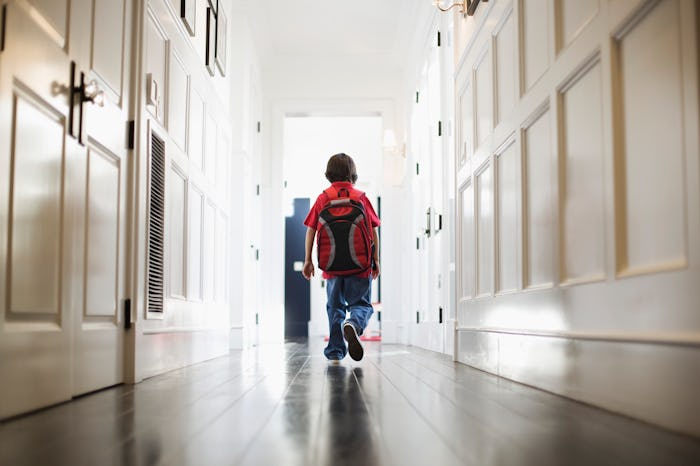News

Study Reveals White Parents Are The Least Concerned Over Sending Kids Back To School
For many working parents, back-to-school season is stressful in even the best of times, and a new study has revealed that whether parents will send their children back to school amid the coronavirus pandemic has proven to be an especially complicated issue, particularly for BIPOC (Black, Indigenous, people of color) working parents. According to a study of 2,000 employed Americans, concerns about their children's health and safety have led many parents to consider alternatives to traditional schooling, which could require them to scale back their time at work.
The study conducted in June by The BDG Trends Group and Luminary, an inclusive collaboration space, found that 85% of Black and Latino or Hispanic working parents reported having concerns about schools' back-to-school plans. Among Asian, Arabic, or multiracial respondents that number dropped only slightly to 84%, while 75% of white working parents reported having concerns.
Citing concerns for their children's health and safety, Black working parents were more likely to say they were considering alternatives to traditional schooling. In fact, the study found that 68% of Black parents were mulling over alternatives to traditional in-person learning, compared with 60% of Hispanic or Latino respondents; 57% of Asian, Arabic, or multiracial respondents; and 46% of white respondents.
Black working parents were also more likely to report having a somewhat or very positive perception of homeschooling or to having developed a more positive perception of homeschooling as a result of the ongoing coronavirus pandemic. According to the study, 65% of Black respondents said they had a positive perception of homeschooling, compared with 61% of Hispanic or Latino respondents; 60% of Asian, Arabic, or multiracial respondents; and 45% of white respondents. Among Black working parents, 69% said their perspective on homeschooling had become more positive as a result of health experts' recommendations to stay at home as much as possible.
It is perhaps unsurprising then that Black working parents were most likely to say they were considering homeschooling their children for the foreseeable future. While just 31% of white respondents; 39% of Asian, Arabic, or multiracial respondents; and 40% of Hispanic or Latino respondents reported actually considering homeschooling, 50% of Black respondents said they were.
Nonwhite respondents were also more likely to report scaling back their work hours either somewhat or very much in order to take on more responsibilities at home related to their children's education. Compared with 52% of white respondents, 75% of the survey's Asian, Arabic, or multiracial respondents; 72% of Black respondents; and 69% Hispanic or Latino respondents said they were scaling back work to pick up education duties at home.
"Our study demonstrates how COVID-19 is impacting communities, especially as families are evaluating school options for the fall," Chief Impact Officer at Luminary Surabhi Lal tells Romper. "The majority of BIPOC families we surveyed are looking for alternatives to going back to school. This signals a broader workplace shift ahead as BIPOC parents may consider scaling back at work to balance mounting schooling responsibilities at home."
Findings from the Luminary and BDG Trends Group study align with recent research from Washington University in St. Louis, which found working mothers have scaled back their paid working hours by 5%, or roughly two hours per week, in order to meet new coronavirus-related demands for child care. In comparison, the study found that fathers' work hours remained largely stable, suggesting that working mothers were having to meet the majority of child care and housework demands amid the coronavirus pandemic. Researchers have warned this widening inequity in work hours could result in long-term career consequences for working moms once the pandemic ends and they attempt to fully re-enter the workforce.
While the ongoing coronavirus pandemic has undoubtedly left everyone feeling like they're living in unprecedented times, the uncertainty around safely reopening schools leaves working parents to face a domino-like set of consequences spread across their own career, income, and financial stability.
If you think you’re showing symptoms of coronavirus, which include fever, shortness of breath, and cough, call your doctor before going to get tested. If you’re anxious about the virus’s spread in your community, visit the CDC for up-to-date information and resources, or seek out mental health support. You can find all of Romper’s parents + coronavirus coverage here.